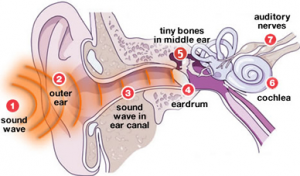The two types of inherited hearing loss include syndromic and non-syndromic. The non-syndromic hearing loss is the common type and consists of sensorineural, conductive and mixed. The sensorineural hearing loss is caused by the damage of the inner ear, the conductive type is the result of problems with the middle ear which can affect the transmission of sound between the ear drum and the inner ear. The mixed hearing loss is the combination of both the sensorineural and conductive types.
The non-syndromic hearing loss is also classified based on inheritance that includes autosomal dominant (DFNA), autosomal recessive (DFNB), X-linked (DFNX) and mitochondrial.
The inherited autosomal recessive deafness is common and accounts for 75% of all congenital deafness. The autosomal recessive form of deafness is the result of a genetic mutation that is inherited from the mother and the father.
Autosomal recessive 2 (DFNB2)
The autosomal recessive non-syndromic deafness (DFNB2) is caused by the mutation in the gene MYO7A on chromosome 11q13. The gene responsible for the Usher syndrome type 1 (USH1B) is identified to the same chromosome region which creates congenital deafness, vestibular dysfunction and a condition known as retinitis pigmentosa. The study of a family from Tunisia identified 22 members with autosomal recessive non-syndromic senorineural hearing loss suggesting that all had profound deafness and the age of onset varied from the birth to 16 years.
Autosomal recessive 3 (DFNB3)
Evidence suggests that the autosomal recessive deafness 3 (DFNB3) is caused by the mutation in the gene MYO15A on chromosome 17p11. It is estimated that across various ethnic groups, DFNB3 appear to be the third most common cause of autosomal-recessive, non-syndromic deafness.
Autosomal recessive 6 (DFNB6)
The autosomal recessive deafness 6 (DFNB6) is caused by the mutation in the transmembrane inner ear expressed gene known as TMIE on chromosome 3p21. The study of multiple Turkish families affected with DFNB6 was confirmed by genetic analysis. The onset of this type was congenital ranging from severe to profound hearing loss.